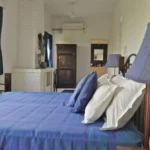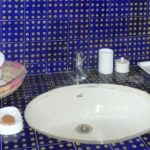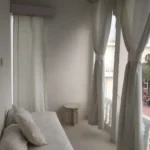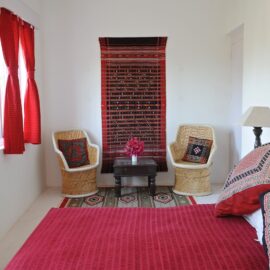Sanjharia, Ajmer Road, Jaipur -302042 INDIA
Check Availability This Room





From
$179.0
Night





With white adobe floors and soft furnishings in deep indigo, this room has a blend of traditional and modern wrought-iron furniture. It has a king-sized wrought iron bed, a traditional Rajasthani wooden wardrobe and one of its special features is a cozy fireplace. While the room’s balcony overlooks the pool from the upper level, a row of windows offer vistas of tree tops and gardens.
This room with its rich shades of indigo blue evokes many aspects of India’s ancient and modern history. Indigo is also among the characteristic colours of two of Jaipur/Rajasthan best-known crafts – hand blockprinted fabrics and hand-made blue pottery.
Throughout the ancient period, India was celebrated as the original home for the production and processing of the indigo plant (Indigofera tinctoria ) for dyeing and printing. Its presence goes back to the Indus Valley period (between the 4th. And 2nd. millennium B.C.). In fact indigo, reportedly among the oldest dyes to be used for textile dyeing and printing on fabrics made from cotton, hemp and silk, travelled from India to ancient Greece and Rome through direct trade. And later, Arab traders introduced it to the Mediterranean and the rest of Europe. As the best known source of a rich blue dye for treating fabrics, it was valued as a luxury product across the world. The association of India with indigo is reflected in the Greek word for the dye, indikón (ινδικόν, Indian). The Romans latinised the term to indicum, which passed into Italian and eventually into English as the word indigo.
In India itself where it was known as neel, indigo was used not only for dyeing fabric but also for making ink and oil based paints for artists. The plant was also prized in the Ayurvedic tradition (India’s ancient indigenous system of medicine) for its powerful anti-bacterial, anti-cancer and anti-oxidant properties, and was used in the preparation of medicines to treat cardiovascular and lung disease, liver and spleen afflictions, epilepsy, rabies, and multiple other lesser ailments. By the 16th. and 17th. centuries, large tracts of land in northern and eastern India were under indigo cultivation.
When the British East India Company began colonizing India in the 18th. century, it quickly saw that indigo could be one of the most profitable commodities to export to Europe, where active industrializing and colonizing powers required it for military uniforms and generally for servicing the burgeoning mechanized textile industry that led the Industrial Revolution.
Britain soon monopolized the global trade out of India, making indigo so valuable as a trading commodity that it came to be called ‘blue gold’. To feed this supply, every farmer in the indigo-growing regions of British India was made to compulsorily grow indigo on a portion of his land, for which he was not paid. Failure to comply meant a huge penalty. This drove farmers into deep poverty, many had to sell homes and possessions to pay the penalties, and many more left India as paupers to become indentured labourers in sugarcane plantations in other British colonies such as Fiji, Mauritius and Trinidad.
Britain continued to control the global indigo trade until the invention of synthetic indigo dyes in Germany in the late 19th. century broke the British monopoly. In 1916-17, protests by indigo farmers for tax abolition – the Champaran movement – became a major turning point in the Indian independence struggle led by Mahatma Gandhi.
Today India is one of the only countries in the world with an unbroken tradition of dyeing and printing using natural dyes extracted from the indigo plant. You may wish to see natural indigo dyes being used in the block printing village of Bagru, just 8 km from Savista.
Check-in/check-out: 12 noon.
For availability and reservations, please write directly to [email protected].
Main features:
Stunning, uniquely-designed, airy rooms with plenty of natural light and views of greenery all around.
Carefully selected handmade / restored Rajasthani furniture and artifacts, or a blend of traditional and modern furniture.
Very comfortable beds for the best possible sleep.
Restored colonial / traditional Indian / contemporary writing desk in most rooms.
Every room has either a sun terrace, or an additional glass-enclosed sitting room / patio with gorgeous views of the outdoors, or an attached balcony overlooking the pool. A few have fireplaces.
Room and bathroom windows can be opened to let in fresh air when preferred.
All bathrooms are ensuite, have hot and cold running water and rain showers, and views of tree-tops.
Facilities:
- Complimentary breakfast;
-
Tea / Coffee making facility;
-
Pure, natural drinking water from Savista’s borewells (complimentary bottled water on request);
-
Complimentary nibbles;
- Free wireless internet;
- Air conditioning;
- Space heating in chilly weather;
- Sumptuous duvet and high quality cotton bed linen;
- Hundred percent cotton towels, robes and room slippers;
- Branded herbal bath products.
Other Facilities:
- Business services (scanning, copying, printing);
- Laundry and ironing*;
- Hair dryer;
- Concierge service;
- Maps and travel guides;
- Medicines, germicide gargle, sewing accessories etc. (an “Ask For” menu is placed in each room. If you require some other service that is not listed, please ask and we will try our best to arrange it for you);
- Doctor/dentist appointments and facilitation;
- For guests with physical disabilities, one room can be outfitted to suit their needs. Please let us know when booking.
(* chargeable)
N.B.
Most rooms feature a large double bed (king-size), and are for single/double occupancy;
Five rooms can be adapted into twin-bedded rooms (please let us know when you are specifically looking for a twin room;
A child below 4 stays free if sharing the parents’ bed;
Children of 4 and above require an extra bed. Four of our rooms can accommodate an extra rollaway bed (for a child only) for a small extra charge. Please email us with your requirement and we will help you make your selection;
All our guest rooms are non-smoking;
We are a pet-free property;
We do not have T.V.s or intercoms in the rooms;
We accept Visa and Master credit cards, Bank to bank transfers and cash payments (we do not accept Amex cards).
No hidden costs: No resort fees and other vague charges; No workout charges; No towel replacement costs; No wi-fi costs; No parking fees; No breakfast bills.
Be the first to review “Indigo”
You must be logged in to post a comment.
Regular plan
| Mon | Tue | Wed | Thu | Fri | Sat | Sun |
|---|---|---|---|---|---|---|
| $179.0 | $179.0 | $179.0 | $179.0 | $179.0 | $179.0 | $179.0 |


Reviews
There are no reviews yet.